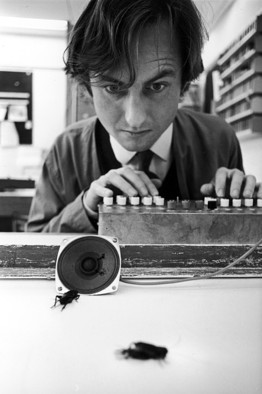Even someone as lacking in religion as myself can be perplexed by Richard Dawkins’ midlife anti-theology mission to irk people of faith on chat shows and the like. In his proselytizing–and that’s what it is–he has the fervor of a particularly devout and curmudgeonly priest. It’s true that many a horrid act has been committed in the name of the father, but so have many others been by those who believe (like Dawkins and I do) that we’re orphans. I don’t want to deny someone on an operating table (or the one doing the operating) from believing in a little in magic at that delicate moment, even if it is rot. Trust in science, and say a prayer if you like.
But I wouldn’t let his noisily running a chariot over the gods make me deny his wonderful intellect and contributions to knowledge, from genes to memes. At Edge, the site’s founder and longtime NYC avant-gardist, John Brockman, has an engrossing talk with the evolutionary biologist about his “vision of life.” The transcript makes for wonderful reading.
Dawkins believes if life exists elsewhere in the universe (and his educated guess is that it does), it’s of the Darwinian, evolutionary kind, that no other biological system besides the one we know would work under the laws of physics. He also notes that we contribute in our own way to the amazing progress of life, even if our time on the playing field can be brutal and brief. As Dawkins puts it, “we are temporary survival machines” coded to be hellbent on seeing our genes persevere, even though life will eventually evolve in ways presently unimaginable to us. It will still be life, and that’s our gift to it. No matter what we personally feel is the main purpose of our existence, it’s actually that.
The opening:
Natural selection is about the differential survival of coded information which has power to influence its probability of being replicated, which pretty much means genes. Coded information, which has the power to make copies of itself—“replicator”—whenever that comes into existence in the universe, it potentially could be the basis for some kind of Darwinian selection. And when that happens, you then have the opportunity for this extraordinary phenomenon which we call “life.”
My conjecture is that if there is life elsewhere in the universe, it will be Darwinian life. I think there’s only one way for this hyper complex phenomenon which we call “life” to arise from the laws of physics. The laws of physics—if you throw a stone up in the air, it describes a parabola, and that’s it. But biology, without ever violating the laws of physics, does the most extraordinary things; it produces machines which can run, and walk, and fly, and dig, and swing through the trees, and think, and produce the whole of human technology, human art, human music. This all comes about because at some point in history, about 4 billion years ago, a replicating entity arose, not a gene as we would now see it, but something functionally equivalent to a gene, which because it had the power to replicate and the power to influence its own probability of replicating, and replicated with slight errors, gave rise to the whole of life.
If you ask me what my ambition would be, it would be that everybody would understand what an extraordinary, remarkable thing it is that they exist, in a world which would otherwise just be plain physics. The key to the process is self-replication. The key to the process is that … let’s call them “genes” because nowadays they pretty much all are genes. Genes have different probabilities of surviving. The ones that survive, because they have such high fidelity replication, are the ones which we see in the world, the ones which dominate gene pools in the world. So for me, the replicator, the gene, DNA, is absolutely key to the whole process of Darwinian natural selection. So when you ask the question, what about group selection, what about higher levels of selection, what about different levels of selection, everything comes down to gene selection. Gene selection is fundamentally what is really going on.
Originally these replicating entities would have been floating free and just replicating in the primeval soup, whatever that was. But they “discovered” a technique of ganging together into huge robot vehicles, which we call individual organisms.•
Tags: John Brockman, Richard Dawkins

